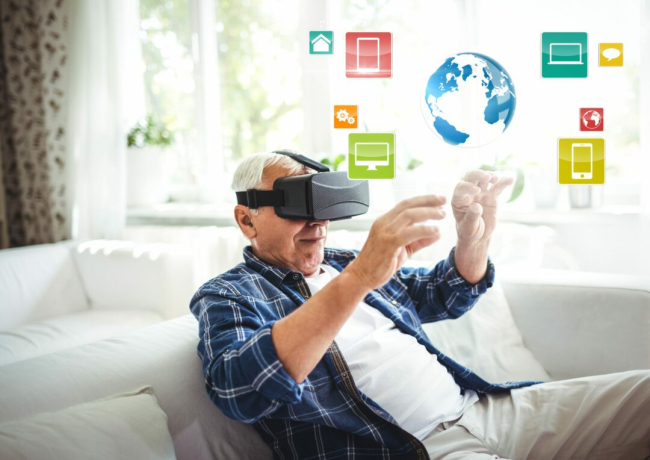
Why aren't Pet Robot and VR headsets used to reduce the loneliness epidemic among the elderly? According to the research on PEW Research Center by Ausbel, J. “the US has the highest rate of elderly living alone.” In the source, The Wall Street Journal, Jargon stated that pet robots and VR headsets have seemed to reduce loneliness but the elderly aren’t yet adapting to them because of their cost and little to no experience with new technology.
Jargon stated that “Older Americans face a growing loneliness epidemic” which is concerning because, over the years, more and more elders in the U.S. are contributing to the loneliness epidemic. In the source “Enhancing Our Lives with Immersive Virtual Reality,” Slater, M., and Sanchez-Vives, M., they say “VR offers us a way to simulate reality,” meaning that we imitate an emotion or an action. In my personal experience when I tried the VR Headsets and went on a roller coaster simulator ride, I wasn't as excited as I get when I enter an amusement park. Or when I'm in line to ride one. The adrenaline wasn't the same, yes, the VR ride was going pretty fast and it looked very real but it wasn’t the equivalent experience you get when you ride a physical roller coaster. This allows me to state that physical interference will never be the same as virtual reality—nothing better than a physical affectionate human to cure loneliness. Jargon also stated “Doctors said that virtual reality, artificial intelligence, and robots can’t substitute human contact but can help reduce loneliness,” which proves my point that even when using any of the new technology, virtual reality, artificial intelligence, and pet robots, you can’t still feel the full affectionate human contact experience. But on the contrary, it could be a temporary solution to help reduce loneliness.
Jargon stated that “the lack of tech support and high prices could lead to older adults purchasing them,” but Jargon also mentions that even countries that have a high economy have yet to adopt this technology, which implies that this new resource of advanced technology that doctors are trying to imply can't be as effective because of the high price. Even though some elders in the U.S. may be able to afford it, others won't, so it wouldn't help reduce the epidemic of loneliness but rather make those elders who are lonely and low-income feel bad since they can’t afford it. Especially because most elders are retired meaning that they don’t have enough funds to cover the cost of this new resource. This could lead to elders feeling frustrated and lead to mental health issues like depression. On the topic of side effects, one of the issues that Slater and Sanches-Vives mention,” the main argument being that the relationship between head moves and image changes are more likely to lead to simulator sickness in 360°” which implies that using a VR headset has side effects, like motion sickness, since elders are more prone to it, since they are relatively new to this technology they might not be used to it.
Jargon also states, “However, she adds, fear of the unknown, lack of tech support,” which proves how some elderly do not know about new technology, so that's why these VR headsets and Pets Robot would be ineffective since most elders won't even know how to properly function it. Slater and Sanches-Vives mention, “already two decades ago people in the travel industry were considering “virtual threat to travel and tourism, (Cheong, 1995) arguing that “the perceived threat of virtual reality becoming a substitute for travel is not unfounded,” which implies that VR could potentially take over the world and maybe since it's fairly new for elderly they feel confused about the idea of is so maybe that's why they are not adapting to this new technology, they don't trust it.
With these articles I can see how technology is advancing nowadays to where it’s a necessity, having the phone for communication is insane. A little over 3 decades ago people used to communicate via letters and in-person, and now nobody can imagine a life without a piece of technology on them. It sounds bizarre to think that a doctor wouldn't prescribe you a robot to reduce your illness whether physically or mentally. Now it's slowly become a new resource for medicine.
As a result, even though VR headsets and Pet Robots are revolutionary in helping reduce loneliness, both are ineffective in helping lower the epidemic of loneliness among the elderly. The best way to cure loneliness in the elderly is for teens to spend more time with their grandparents and create memories, instead of being stuck on social media all day, should be more productive, and potentially even have teens volunteer at retirement homes to help elderly get more of that human affection rather than from some wire up device.

